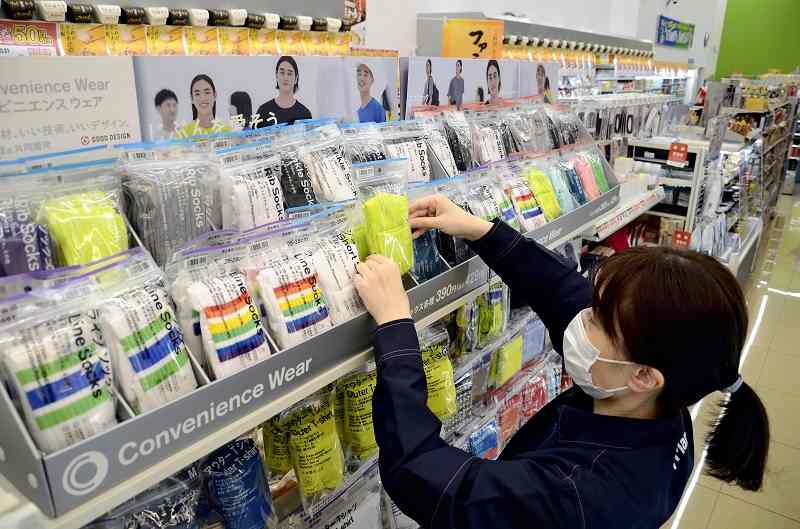Convenience stores in Japan become ‘one-stop shops’ with more clothes, household goods

Colorful socks and shirts are lined up at a FamilyMart outlet in Minato Ward, Tokyo.
11:13 JST, September 3, 2022
Major convenience store operators are finding new business opportunities in areas such as clothing and household goods.
They are attempting to capture the increasing demand for “one-stop shopping” amid the spread of the coronavirus by offering a wide selection of products, not just their mainstay food items.
FamilyMart Co. introduced seven new products in June, including new socks and towels, under its Convenience Wear apparel brand.
The company has successively released a series of new products, including a foldable backpack in April and children’s socks in May.
The company rolled out its Convenience Wear line nationwide in March 2021 and now offers about 75 different types of items including brightly colored T-shirts that cost ¥1,089.
In particular, socks with the same green and blue lines as the store’s logo became a hit on social media, selling more than 7 million pairs.
FamilyMart’s clothing sales for the fiscal year ending February 2022 increased 40% from the previous fiscal year.
The company intends to go on the offensive by expanding its lineup even further, with an official in charge of clothing saying, “We want to gain a good share of the apparel market.”
Seven-Eleven Japan Co., the largest convenience store chain, had expanded its selection of products supplied by the ¥100 store operator Daiso Industries Co. to almost all of its outlets by August.
The company began introducing the products at some of its stores in December 2020, attracting customers mainly with household goods such as wet wipes and garbage bags.
Lawson Inc. plans to introduce about 200 more products from Ryohin Keikaku Co.’s MUJI brand, such as stationery and clothing, to about 5,000 outlets in the Kanto and Koshinetsu regions by the end of September, and to expand nationwide in 2023.
Lawson began selling the products in June 2020, and sales have increased at the outlets where they were introduced, the firm said.
As convenience stores are small, and their range of daily necessities and miscellaneous goods is smaller than those of drugstores and DIY stores, until now most daily necessities have been purchased as a stopgap in case of an emergency.
Lately, however, consumers have increasingly been looking for one-stop shopping in order to avoid catching the virus.
Convenience store operators believe that growing their range of non-food items will “lead to more visits to their stores,” as an official of a major store operator said.
“These stores can increase convenience by providing consumable items that customers buy regularly. They can also encourage impulse buying of beverages and food, which is their strength,” said Hidehiko Aoki, a professor of business administration at Tokyo University of Science and an expert on the distribution industry, said.
Although the performance of the three major convenience store operators has been recovering since the early days of the pandemic, the number of customers has yet to reach the pre-pandemic level. It remains to be seen whether the strengthening of clothing and daily necessities will trigger a turnaround.






